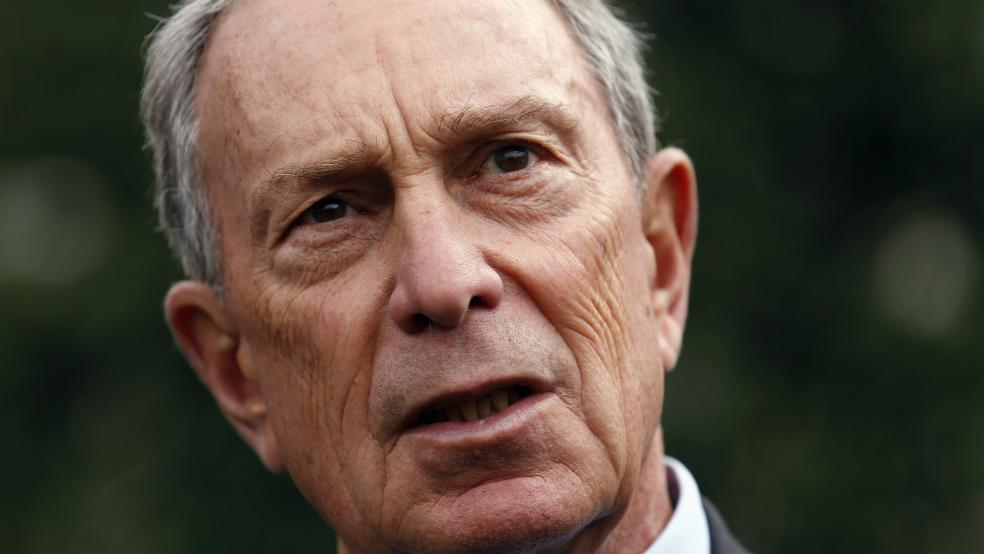Former New York City mayor Michael Bloomberg took a long, hard look at mounting an independent campaign for president this year, prompted by nagging concerns that if GOP presidential frontrunner Donald Trump were elected, it would be a disaster for the country.
Previous independent and third party campaigns for president dating back to Theodore Roosevelt in 1912 and H. Ross Perot in 1992 all waged losing battles. Bloomberg, the 74-year-old multi-billionaire and political moderate, would likely face a similar fate by launching an improbable national campaign at this late date. Yet his animus was so great for Trump, another New York City billionaire who was espousing far right and Xenophobic views on immigration, Muslims and national defense, that he seriously considered pouring hundreds of millions of his own fortune into a bid to stop him.
Related: If Michael Bloomberg Enters the Race, He Could Help Trump
On Monday, Bloomberg said he would stand back and allow the general election to unfold without him – likely with Trump the GOP nominee clashing with former Secretary of State Hillary Rodham Clinton for the White House.
"When I look at the data, it's clear to me that if I entered the race, I could not win,” Bloomberg wrote in a column in Bloomberg View, his opinion site. “I believe I could win a number of diverse states -- but not enough to win the 270 Electoral College votes necessary to win the presidency.”
Moreover, the former three-term independent mayor feared that if he entered a race, he would risk either draining moderate Democratic support from Clinton or throwing the election into the House of Representatives, where a Republican majority would hand the election to Trump.
During the early stages of his deliberations, Sen. Bernie Sanders, a democratic socialist from Vermont, was threating to sidetrack Clinton’s campaign with his broad appeal to liberals and young people. Bloomberg signaled that he would consider entering the race if the general election contest pitted Sanders against Trump – an almost certain losing cause for the Democrats.
Related: ‘National Review’ Tries to Take Down Donald Trump
Bloomberg combined conservative, business-friendly economic policies with liberal views on gun control, health care and other social issues.
But with Clinton now apparently on track to claim the Democratic nomination this summer – unless she’s derailed by being indicted over her misuse of emails during her four years as secretary of state – Bloomberg apparently is satisfied to stand back and let that political drama play out.
Howard Wolfson, a long-time senior adviser to Bloomberg, told MSNBC on Monday afternoon, “Certainly there was a recognition [by Bloomberg] of the gravity of the decision. All of the data that we had showed that his message and his biography were incredibly compelling – but not compelling enough given the structural impediments against a third party candidate to get to 270.”
“The fact is, even if I were to receive the most popular votes and the most electoral votes, victory would be highly unlikely, because most members of Congress would vote for their party’s nominee,” Bloomberg wrote today.
Related: Why Every Candidate in the 2016 Race Should Fear Mike Bloomberg
“As the race stands now, with Republicans in charge of both Houses, there is a good chance that my candidacy could lead to the election of Donald Trump or Senator Ted Cruz,” he added. “That is not a risk I can take in good conscience.”
Bloomberg – who has a net worth of an estimated $37 billion – made his mark in publishing before leading New York through a tumultuous decade beginning in 2001 punctuated by the 09/11 terrorist attacks.The New York Times reported in January that Bloomberg has ordered some of his advisers to begin sketching out plans for a potential independent campaign. The former mayor and media baron reportedly was “galled by Trump’s dominance” in the GOP campaign and perplexed and troubled by how poorly Clinton was doing against Sanders.
Bloomberg’s decision to stay out comes just days after former governor Mitt Romney, the 2012 GOP presidential nominee, delivered a scathing speech denouncing Trump as a con man and conservative fraud who, if elected, would lead the country into an economic and foreign policy disaster. The announcement also comes at a time when Romney and other GOP party elders and establishment politicians are mounting a late-inning effort to block Trump’s drive for the nomination and aid the few remaining challengers, including Sens. Ted Cruz of Texas and Marco Rubio of Florida and Ohio Gov. John Kasich.
Bloomberg indicated that while he will stay out of the presidential contest, he would not remain silent about Trump.
“I have known Mr. Trump casually for many years, and we have always been on friendly terms. I even agreed to appear on ‘The Apprentice’—twice,” Bloomberg wrote. “But he has run the most divisive and demagogic presidential campaign I can remember, preying on people’s prejudices and fears.





